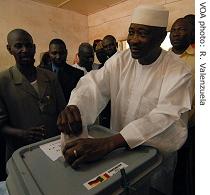-
(单词翻译:双击或拖选)
Dakar
15 May 2007
The incumbent1 president of one of Africa's poorest countries, Mali, has been declared the winner of the country's recent presidential election. But, as in several African countries where there have recently been elections, there is growing apathy2 for the democratic process, and doubt about what the government can deliver in terms of economic progress. Selah Hennessy reports from the VOA West Africa Bureau in Dakar.
 |
| President Amadou Toumani Toure votes, 29 April 2007 |
Mr. Toure's triumph in the election was no surprise. The former military leader, who calls himself the "soldier of democracy," won a clear victory. It was the fourth democratic election since the end of military rule.
At other polling stations voters seemed somewhat confused about how to vote.
And there was an apathetic6 mood in much of the capital. Less than 40 percent of the population turned out for the election. Many people saw the re-election of Mr. Toure, who has been in power since 2002, as a foregone conclusion and said they did not see any point in voting.
But Ibrahim Boubacar Keita, a rival candidate who was once an ally, is one opposition7 voice that was heard during the election.
Large crowds listened to his speeches, in which he called for an end to Mr. Toure's-broad-based politics and voiced the need for effective reforms that would improve the lives of the common citizen.
Ibrahima Fadiga is one unemployed8 man who agrees with Mr. Keita's views. He says no one has enough money to buy food, electricity or water. He says the government makes a lot of false promises. Fadiga is not the only one angry.
Another opposition activist9 says he is tired of seeing the president erect10 new monuments and begin new projects, when nothing changes for most people. He says the president should stop making election promises that are only lies. He says the president must be more honest.
It seems there are many speeds to Mali's economy. Overall, growth is above five percent.
Peaceful elections bring aid to the country, hundreds of millions of dollars towards building new roads, schools, and hospitals.
But Mali's problems persist. Little gets built and more than half the adult population remain unemployed.
While democracy is being slowly consolidated11 in Mali, like in many underdeveloped countries throughout West African countries, large chunks12 of the population continue to stagnate13 in idleness and disease.
 收听单词发音
收听单词发音
1
incumbent

|
|
| adj.成为责任的,有义务的;现任的,在职的 | |
参考例句: |
|
|
|
2
apathy

|
|
| n.漠不关心,无动于衷;冷淡 | |
参考例句: |
|
|
|
3
standing

|
|
| n.持续,地位;adj.永久的,不动的,直立的,不流动的 | |
参考例句: |
|
|
|
4
commotion

|
|
| n.骚动,动乱 | |
参考例句: |
|
|
|
5
ballot

|
|
| n.(不记名)投票,投票总数,投票权;vi.投票 | |
参考例句: |
|
|
|
6
apathetic

|
|
| adj.冷漠的,无动于衷的 | |
参考例句: |
|
|
|
7
opposition

|
|
| n.反对,敌对 | |
参考例句: |
|
|
|
8
unemployed

|
|
| adj.失业的,没有工作的;未动用的,闲置的 | |
参考例句: |
|
|
|
9
activist

|
|
| n.活动分子,积极分子 | |
参考例句: |
|
|
|
10
erect

|
|
| n./v.树立,建立,使竖立;adj.直立的,垂直的 | |
参考例句: |
|
|
|
11
consolidated

|
|
| a.联合的 | |
参考例句: |
|
|
|
12
chunks

|
|
| 厚厚的一块( chunk的名词复数 ); (某物)相当大的数量或部分 | |
参考例句: |
|
|
|
13
stagnate

|
|
| v.停止 | |
参考例句: |
|
|
|















